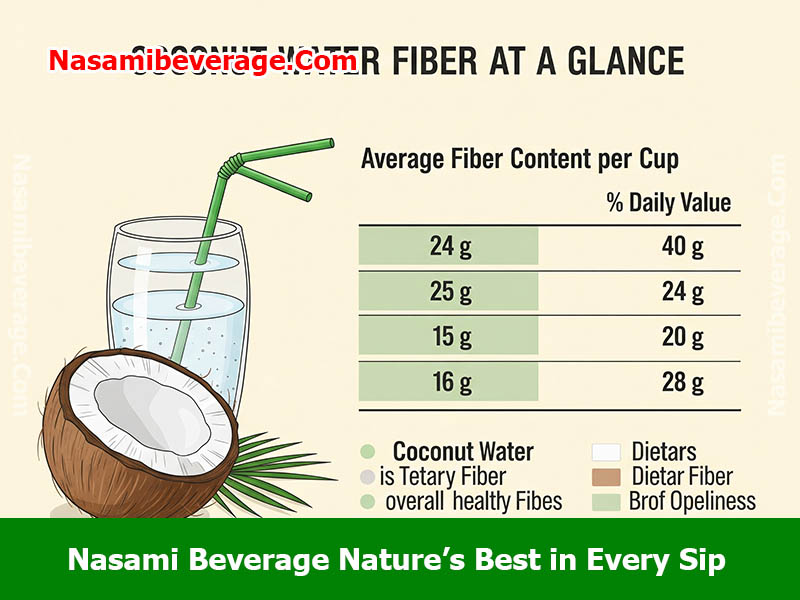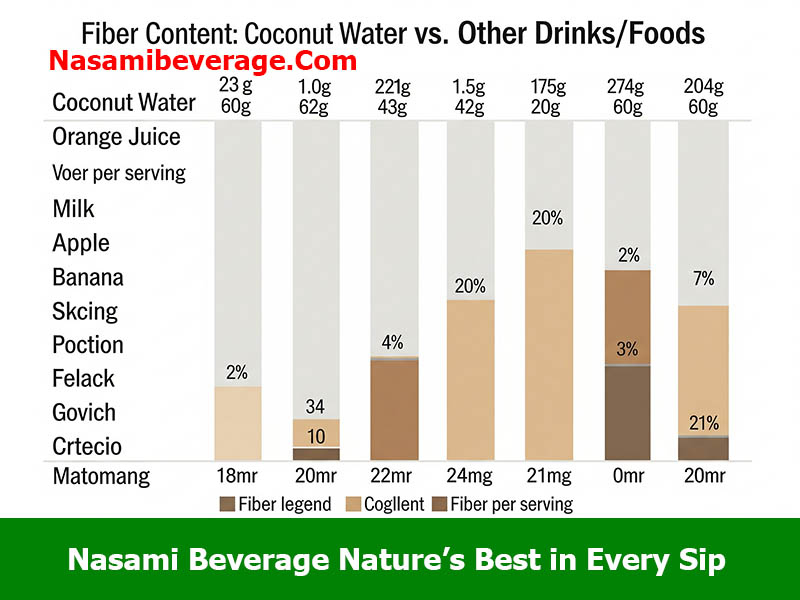Coconut water has surged in popularity as a go to beverage for hydration, celebrated for its natural electrolytes and refreshing taste. Many appreciate it as a healthier alternative to sugary sodas and sports drinks. But beyond its hydrating properties, a common question arises for the health conscious consumer: how much fiber is in coconut water? This article delves into the fiber content of this popular drink, explores its health implications, and compares different sources to give you a clear understanding. For a general overview, you can learn more about coconut water and its place among healthy drinks.
Understanding the nutritional components of what we consume is key to a balanced diet. While coconut water is lauded for potassium and low calorie counts (and if you’re wondering specifically how many calories in coconut water, that’s another important aspect to consider), its fiber contribution is often a point of curiosity. We aim to provide a comprehensive answer, examining not just the quantity of dietary fiber but also its significance for your body and how it stacks up against other options.
Unpacking the fiber content: Numbers and nuances
Dietary fiber, an essential component of a healthy diet, refers to the parts of plant foods that your body cannot digest or absorb. It plays a crucial role in maintaining gut health, regulating blood sugar levels, and aiding in weight management. When considering coconut water, it’s important to look at the specifics of its dietary fiber content.
Fiber quantity per serving in coconut water
So, what is the typical fiber quantity per serving in coconut water? Generally, an 8 ounce (approximately 240ml) serving of fresh, unsweetened coconut water can contain between 0 to 3 grams of fiber. Most commonly, you’ll find around 2.6 grams of fiber in one cup of 100% coconut water.
This amount can contribute to your daily fiber needs, which the Academy of Nutrition and Dietetics recommends as about 14 grams for every 1,000 calories consumed, or roughly 25 grams for women and 38 grams for men daily. The amount of fiber in coconut water can vary based on the coconut’s age and variety.
Understanding coconut water nutrition labels for fiber information
To accurately determine the fiber content, understanding coconut water nutrition labels for fiber information is crucial. When you pick up a packaged coconut water, check the “Nutrition Facts” panel. Look for “Dietary Fiber” listed under “Total Carbohydrate.”
Some brands might have minimal or even zero fiber, especially if they are highly processed or have added sugars and other ingredients that dilute the natural coconut water. The coconut water nutrition label is your best guide to the specific fiber content of the product you are choosing.

The natural variations by coconut type and maturity can also influence the fiber content. Younger green coconuts, typically used for coconut water, will have different nutritional profiles than mature brown coconuts, which are more commonly used for coconut meat and milk. However, for commercially available coconut water, the processing and sourcing can average out these natural variances to some extent.
The digestive and health role of coconut water’s fiber
Even if the fiber content in coconut water seems modest, it still contributes to the overall coconut water fiber benefits for body. Every gram of fiber counts towards your daily intake and supports various bodily functions, especially those related to digestion and metabolic health. There are many advantages of drinking coconut water, and its fiber content is one of them.
How coconut water fiber affects digestive health
One of the primary ways fiber in coconut water affects digestive health is by promoting regular bowel movements. The dietary fiber present can help add bulk to stool, making it easier to pass and thus helping to prevent constipation. This directly addresses the question, does coconut water help with digestion?

Yes, in part due to its fiber. Furthermore, fiber acts as a prebiotic, feeding the beneficial bacteria in your gut. A healthy gut microbiome is essential for overall health, influencing everything from digestion and nutrient absorption to immune function.
Fiber’s contribution to blood sugar regulation
The coconut water fiber role in blood sugar regulation is another important aspect. Dietary fiber, particularly soluble fiber, can slow down the absorption of sugar into the bloodstream. This helps to prevent sharp spikes in blood glucose levels after consumption.
For a beverage like coconut water, which naturally contains some sugars, the presence of fiber can be beneficial in modulating this sugar uptake, making it a more favorable option than drinks with no fiber and high sugar content. Beyond fiber, it’s also worth exploring whether does coconut water have antioxidants, as these compounds offer additional health benefits.

While fiber isn’t the primary component responsible for hydration, the coconut water fiber impact on hydration effectiveness is an interesting consideration. The main role of coconut water is to rehydrate due to its water and electrolyte content.
The fiber is an added nutritional bonus. It doesn’t directly enhance hydration but contributes to the overall health profile of the beverage, making natural coconut water a good choice for a refreshing and mildly beneficial drink.
Is coconut water your go-to fiber source? A comparison
This brings us to a critical question: Is coconut water a good source of fiber? While it does contain some fiber, it is generally not considered a high fiber beverage. If your primary goal is to significantly boost your fiber intake, there are more potent sources available. However, its fiber content is a welcome addition to its other nutritional benefits.
Coconut water fiber vs. other beverages and foods
When we look at coconut water fiber compared to other beverages and foods, the perspective becomes clearer. For instance, many fruit juices, especially those with pulp like orange juice, might offer a similar or slightly higher amount of fiber. However, whole fruits and vegetables, legumes, and whole grains are far superior sources.
An apple can provide around 4 grams of fiber, and a cup of black beans boasts about 15 grams. Plain water, of course, contains no fiber. So, while coconut water is better than fiberless sugary drinks, it doesn’t replace high fiber foods.
Fresh vs. packaged coconut water: Does fiber content differ?
The debate between packaged coconut water fiber content vs fresh is also relevant. Fresh coconut water, straight from the coconut, is generally in its most natural state. Processing for packaged versions can sometimes alter nutritional content. Some brands may filter the water extensively, potentially reducing the natural fiber. It’s also common for natural coconut water fiber levels and nutrients to be higher in unadulterated versions.

Always check the label of packaged products, as some may contain very little fiber or have added sugars that negate some health benefits. For instance, brands like Harmless Harvest often highlight their minimal processing, which might better preserve natural components, whereas other highly processed or flavored options might have less fiber. Consumers interested in the fiber from specific brands coconut water list fiber amount on their packaging should always consult these labels.
Practical tips and common fiber questions
Knowing how to increase fiber intake with coconut water can be useful if you enjoy the beverage and want to maximize its benefits. While it’s not a primary fiber source, you can incorporate it into a fiber conscious diet. For example, use coconut water as a liquid base for smoothies and add high fiber ingredients like chia seeds, flaxseeds, spinach, or fruits like berries and bananas. This way, you get the hydration and electrolytes from coconut water plus a significant fiber boost.
Are there coconut waters with zero fiber?
It’s a valid concern: zero fiber in some coconut water products? Yes, this can be the case. Highly processed versions, some flavored coconut water drinks, or coconut based beverages with many additives might have their natural fiber stripped away or be formulated without it. This again underscores the importance of reading labels carefully to ensure you are getting what you expect, especially if dietary fiber is a consideration for you.
Any concerns with coconut water fiber?
Regarding side effects too much fiber from coconut water, it’s generally unlikely. The amount of fiber in typical servings of coconut water is modest. For most people, it will not cause digestive distress. However, individuals with very sensitive digestive systems or those who suddenly increase their overall fiber intake significantly (from all sources) might experience gas or bloating. But this would rarely be attributable to coconut water’s fiber content alone.
Frequently asked questions (FAQ) about coconut water and fiber
How much fiber is in 100ml of coconut water?
Typically, 100ml of coconut water contains approximately 0.5 to 1.1 grams of fiber. However, this can vary depending on the brand, processing, and natural variations in the coconuts.
Can I rely on coconut water for my daily fiber needs?
While coconut water contributes some fiber, it’s best to rely on a diverse diet rich in fruits, vegetables, legumes, and whole grains to meet your daily fiber requirements. Coconut water should be seen as a supplementary source at best.
Does the fiber in coconut water help with weight loss?
Fiber can promote feelings of fullness, which may indirectly support weight management by reducing overall calorie intake, which relates to the question of whether is coconut water good for weight loss. Coconut water is also relatively low in calories. However, its fiber content alone is not substantial enough to be a primary driver for weight loss.
Is the fiber in coconut water soluble or insoluble?
Coconut water likely contains a mix of both soluble and insoluble fiber, though detailed breakdowns are not always provided on labels. Both types of fiber offer health benefits, from aiding digestion to helping regulate blood sugar and cholesterol levels.
Does coconut water from a young or mature coconut have more fiber?
Young green coconuts are primarily harvested for their water, which contains electrolytes and some dietary fiber. As a coconut matures, the composition of its water changes, and the meat becomes thicker. While there can be slight variations, commercial coconut water is typically sourced from young coconuts and its fiber content is generally within the ranges discussed.
To sum up, coconut water does contain dietary fiber, typically around 0 to 3 grams per 8 ounce serving, though amounts can vary. This fiber contributes to digestive health and can play a small role in blood sugar regulation. While it’s not a fiber powerhouse compared to whole foods, it’s a beneficial component of an otherwise healthy beverage known for hydration and electrolytes.
For optimal health, focus on a balanced diet with diverse sources of fiber. Enjoy coconut water for its refreshing qualities and electrolytes, with its fiber content being an added bonus rather than a primary reason for consumption if high fiber intake is your main goal. Always check labels on packaged coconut water to understand its specific nutritional profile, including its fiber content. For more insights into quality beverage options, consider exploring resources like Nasami Beverage.



